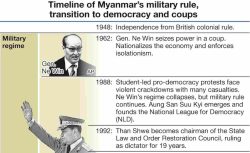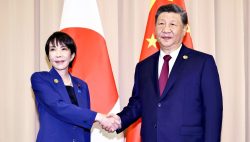French National Assembly Election: Rise of Right-Wing Forces has been Thwarted, But Divisions are Deeper
16:49 JST, July 9, 2024
Although the right-wing movement that is gaining momentum in Europe was prevented from becoming the largest force in the assembly, the divisions in French politics have deepened. President Emmanuel Macron will face difficult times in managing his government.
Following the second round of voting for the French National Assembly, the lower house of the legislature, the leftist coalition moved into first place. The ruling centrist coalition supporting Macron’s government lost a significant number of seats and dropped to second place.
The right-wing National Rally party, which was the top vote-getter in the first round, sank to third. In the final round of voting, the ruling bloc and leftist forces worked together to put forward just on ecandidate from them, in order to field single candidates to fight against the NR. The strategy worked.
NR has its roots in a far-right movement that once advocated antisemitism and other forms of xenophobia and insisted on leaving the European Union. Concern over letting those forces take control of the assembly led to a makeshift partnership between the ruling centrists and the leftists.
NR became the top French party in the European Parliament elections in June, which were held under a proportional representation system. Their strategy of sealing off their radical claims and giving the impression they had transformed into a “normal party” can be said to have been successful.
Feeling a heightened sense of urgency, Macron responded by immediately dissolving the lower house. He apparently calculated that he could win the lower house election over the right-wing movement, as it is contested on the basis of the number of voters cast in each constituency.
His calculation was partly correct, but the leftists that oppose Macron have now become the top force in the lower house. The unstable political situation is expected to continue.
The lower house has become a “hung parliament” with none of the three main forces securing an absolute majority. Cooperation with each group will have to be sought on a bill-by-bill basis.
The leftists are calling for the capping of prices for food and other daily essentials and a reversal of higher pension age implemented by Macron. The gaps with Macron’s policies, which have emphasized fiscal discipline, are significant.
Foreign affairs and security are the exclusive purview of the president, but the assembly holds the authority to approve the budget.
The leftists are also demanding the post of prime minister. This will be the first “cohabitation” of a president and prime minister from different political groups since 2002. Policy coordination will be more complicated and inevitably more difficult.
Although Macron has adopted a centrist approach, he is regularly criticized for abandoning the weak over issues such as pensions. It is undeniable that this stance has encouraged radical forces on both the left and right and has widened the divisions in society.
It is hoped that in the run-up to the Paris Olympics, France will quickly bring its political turmoil under control and restore stability as a major European country.
(From The Yomiuri Shimbun, July 9, 2024)
Top Articles in Editorial & Columns
-

Myanmar Will Continue Under Military Rule Even After Election, Ex-Ambassador Maruyama Says in Exclusive Interview
-

40 Million Foreign Visitors to Japan: Urgent Measures Should Be Implemented to Tackle Overtourism
-

Expansion of New NISA: Devise Ways to Build up Household Assets
-

China Criticizes Sanae Takaichi, but China Itself Is to Blame for Worsening Relations with Japan
-

Withdrawal from International Organizations: U.S. Makes High-handed Move that Undermines Multilateral Cooperation
JN ACCESS RANKING
-

Univ. in Japan, Tokyo-Based Startup to Develop Satellite for Disaster Prevention Measures, Bears
-

JAL, ANA Cancel Flights During 3-day Holiday Weekend due to Blizzard
-

China Confirmed to Be Operating Drilling Vessel Near Japan-China Median Line
-

China Eyes Rare Earth Foothold in Malaysia to Maintain Dominance, Counter Japan, U.S.
-

Japan Institute to Use Domestic Commercial Optical Lattice Clock to Set Japan Standard Time



















